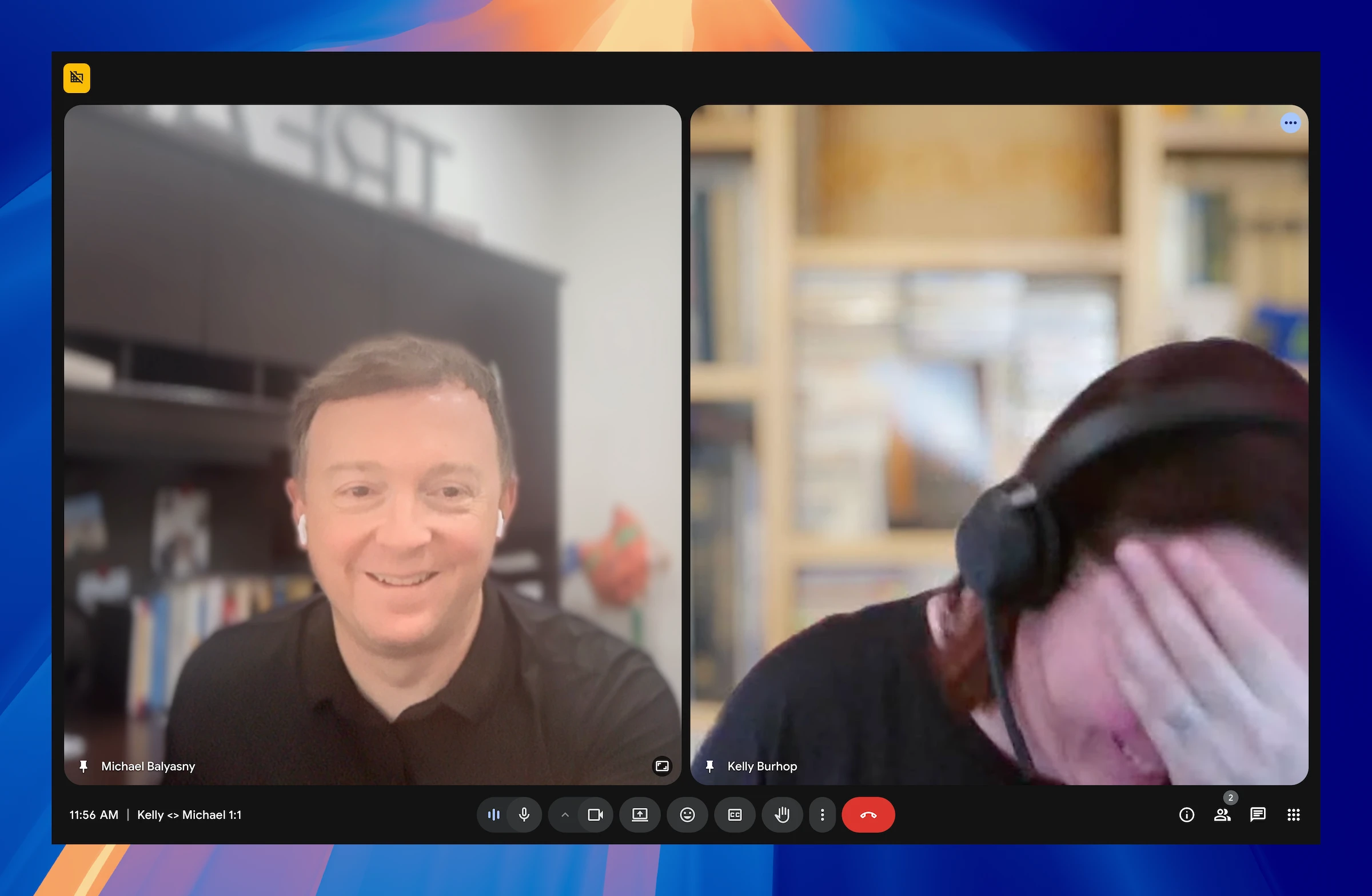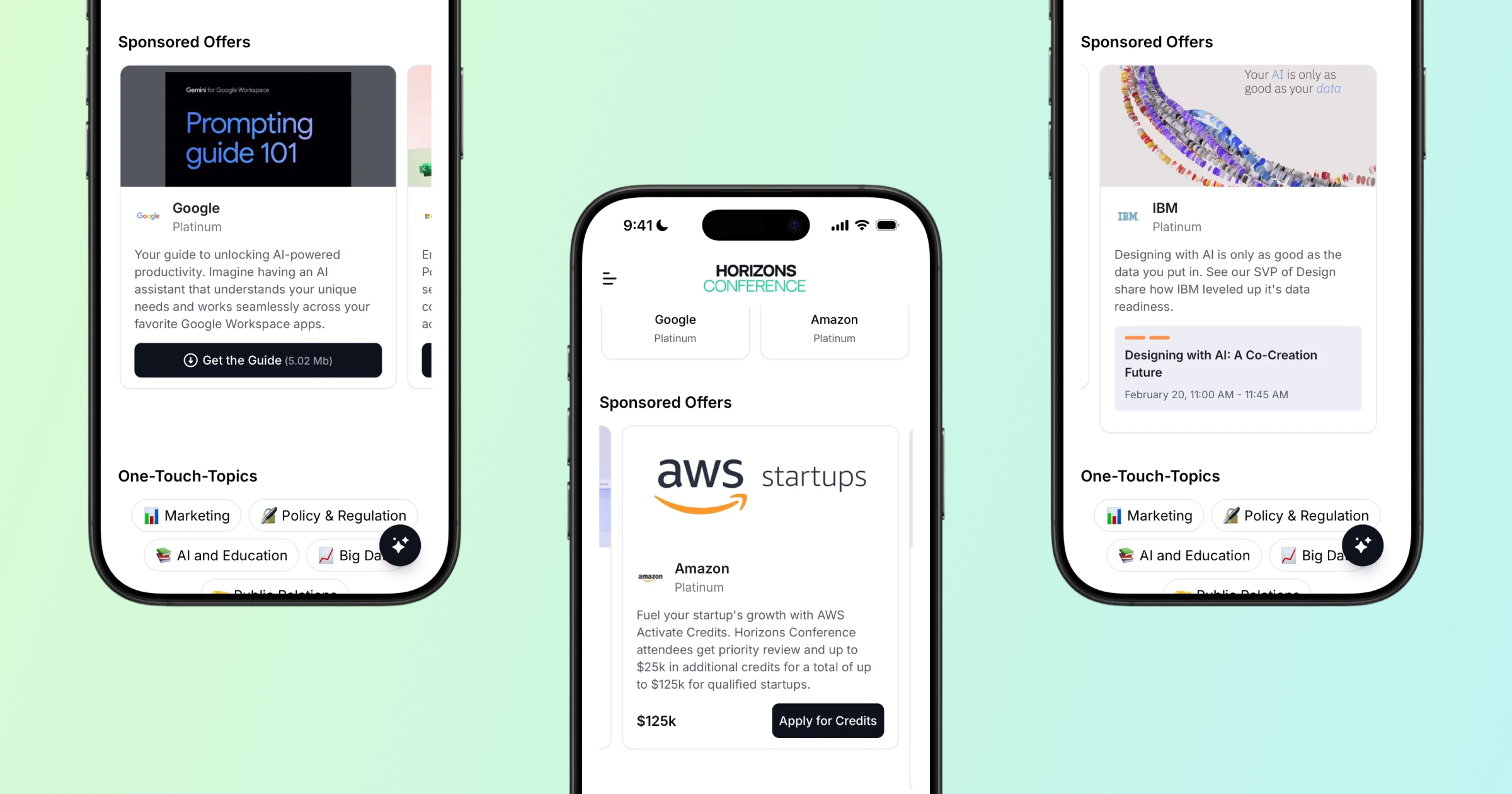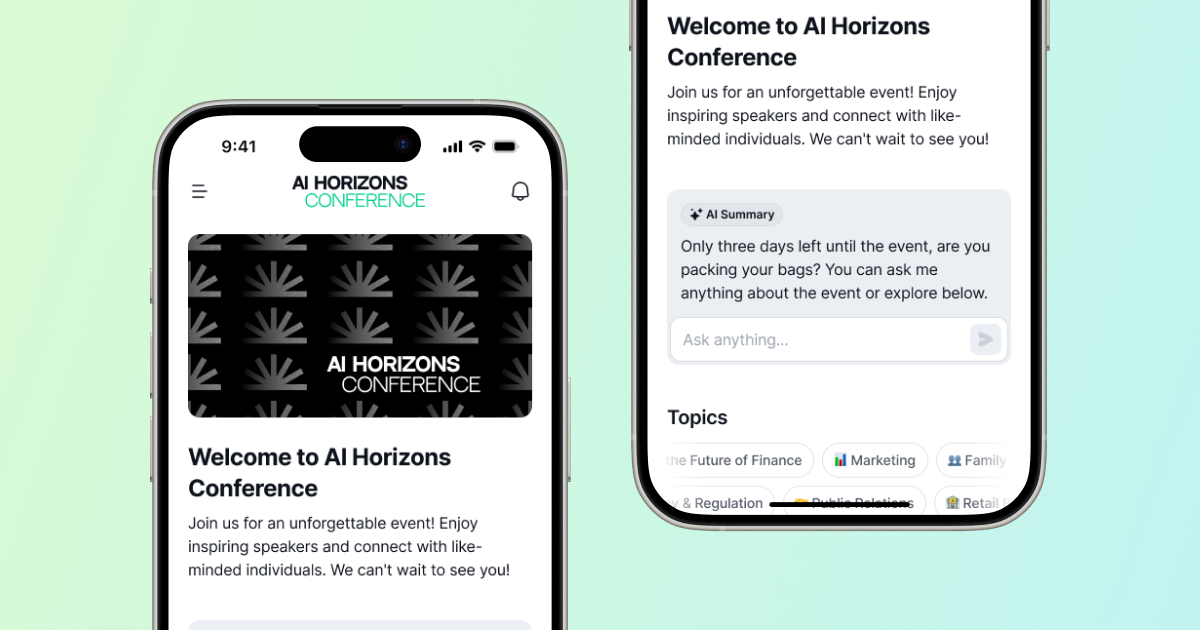Recently I had the chance to connect with Kelly Burhop, an event strategist, planner, and technologist who spent the past decade leading events at Intel.
After seeing our early work at Highbar.ai, building an AI-native mobile event app, Kelly reached out with a provocative idea:
“What if planners could vibe-code an event app in 10 minutes?”
That question, provocative as it is for an app developer 😅 kicked off a fun conversation where we challenged each other to explore what AI could really mean for events:
- Will AI really let us vibe-code event apps?
- What changes in the next year?
- What shifts over the next three years?
- What’s the five-year vision?
- What advice do planners and tech buyers need right now?
We brought diverse experience to this conversation. Kelly as an enterprise-level event strategist, and me as a founder building event tech for 13 years, but mostly serving SMB planners. Here's what ensued:
First Reactions: AI-Built Event Apps
Kelly’s Perspective:
When I was at Intel, I watched a pattern repeat itself over and over. We'd roll out powerful event management software, provide training, offer ongoing support, yet our event planners kept defaulting to expensive agency support instead of directly using the tools we'd invest in.
Why? It wasn't about capability or willingness. Event planners juggle a dozen responsibilities and they simply don't have bandwidth to master another tool, no matter how user friendly or how useful it might be.
Imagine if instead of learning software, our event planners could simply describe what they need and get a working app in return. The speed of deployment could go from months to days and the support budget could be saved or reallocated to other areas of the event.
Now I realize the best software isn't always the most feature-rich. It's the most immediately usable. Instead of asking planners to learn yet another complex system, AI promises to meet them where they are with natural language descriptions of what they need.
Michael's Take:
Kelly's point about software complexity really resonates. There’s no question that the goal for event tech was never to create jobs around navigating clunky tools, and yet that’s exactly the trap we've fallen into.
We all want more event jobs, but papering over the UI/UX deficiencies of legacy event technology platforms isn’t durable. We run the same risk today, except this time we’ll replace 'software complexity' with 'AI complexity.'
Training prompts, debugging outputs, and maintaining AI-generated apps doesn’t erase the hard parts. Scalability, integrations, security, and APIs. The endless complexity of building world-class software is as real as ever. AI may reduce headcount, you may ship faster, and one day you might one-shot an event app that’s decent. But decent isn’t the goal. Great software still takes real expertise.
AI feels like magic. It makes software more accessible, affordable, and powerful. But magic has limits. Complexity does not disappear, it shifts.
The real metric shouldn't be the number of features or even the speed of deployment. It's how many planner hours AI saves. If technology gives planners back time for strategy, experience design, and community building, then we're moving in the right direction.
1-Year: AI as Intelligent Assistant
When we turned to short-term predictions, both Kelly and I saw AI's immediate impact happening through augmentation rather than replacement.
Kelly's 1-Year Vision:
- AI Assistant Layer - AI assistants built into existing platforms (already happening)
- Smarter Data Synthesis - Post-event reports that provide actionable insights instead of raw data dumps
- Personalized Attendee Experiences - Highly personalized experiences based on historical attendee and customer data
- Better Integrations - AI helping data flow better between registration, CRM, marketing automation, and analytics platforms
This last point on better integrations sparked our most interesting disagreement.
Michael's Take:
Kelly’s predictions are spot-on, and we’re already seeing elements of this come to light. That’s exciting, real innovation is coming back to event tech.
The only part I disagree about is the importance of integrations. That feels like a mirage because integrations are inherently limiting. They connect systems at the edges, but they do not expand the context that matters most.
No matter how good models get, they are limited by the aperture of what they can see about your event. The more context you provide, the greater the strategic and experiential value of the AI.
This is why at Highbar we started with the event app rather than registration or other traditional tools.
"If AI is going to make events smarter, it has to start with the event experience itself."
The experiential component matters most because that's where the signal is, the real data about what attendees actually do, not just what they say they'll do when they register.
3 Years: The Transformation Begins & New Roles Emerge
Our 3-year predictions revealed where this technology shift gets really exciting and potentially disruptive.
Kelly's Vision:
A new class of AI-augmented event strategists who can deliver agency quality outcomes at internal-team speeds and costs.
- Custom event apps become reality - working prototype in hours, fully deployed in days
- Agency model changes - middle tier agencies doing standard implementations get impacted by AI-powered internal teams
- Predictive event intelligence - AI predicts outcomes and resource allocation becomes data-driven
- Real-time event optimization - events adapt as they happen with real-time networking recommendations, catering adjustments, session rooms that resize based on predicted attendance
- Planners become directors - AI handles venue research, coordination, agenda creation, and logistics
- Industry consolidation - Event tech landscape simplifies dramatically. Instead of integrating multiple tools AI will manage end-to-end workflows. Whoever can crack this will take massive market share.
Michael's Take:
"Planners as orchestrators and taste-makers” feels very real, but it depends on one thing: whether we can capture event experience data at scale and put it to work. Without that, AI will only optimize logistics, not elevate events.
I also pushed back on the idea that custom apps would be dramatically different from today's in-house, custom solutions. They will certainly be better, but still require maintenance. Complexity does not vanish, no matter how much you abstract it away. Prompting your way to a one-off app that is hard to reuse will not cut it.
The real value will come from next-generation vendors that are accountable to product quality and user experience, not propped up by legacy monopoly power and complexity.
“AI raises the bar too high for clunky software to survive. Once people experience true personalization, they will not go back."
5 Years: Events as Living Intelligence
When we pushed our thinking to the 5+ year horizon, both of our visions became more philosophical and ambitious.
Kelly’s 5-year Vision:
"Events as living business intelligence systems that continuously optimize for human connection and business outcomes."
- The autonomous event economy - companies set business objectives and AI automatically designs, executes, and optimizes touch-points
- Predictive attendee modeling - AI knows who will attend before you send invitations
- Business intelligence integration - Events become spokes in a company's intelligence network
- Highly personalized mass experiences - Every attendee gets a unique event, personalization at scale where every attendee is their own attendee type
- Creativity unleashed - Event professionals become experience makers focused on human elements AI cannot create
My Take:
Events as living business intelligence systems should be our north star, that's so perfectly put. And that's not just a vision for event technology, it is a vision for a more human-centric future.
That's no doubt that algorithmic social feeds have had a mixed impact (to put it mildly). AI offers a possible offramp. And yes, it can all go wrong, but it can also go right. The positive version is reality-based experiences that bring us closer together, grounded in truth, connection, and good-faith conversations.
"Events can be the counterweight to digital noise."
I also speculated about new form factors: "Instead of static apps built for specific situations, we will have adaptive experiences that fit each attendee's context in real time. If the model knows enough about your situation, it can give you the exact next step you are looking for, one click, and you are back in the event."
Practical Advice: How to Prepare for What's Coming
Kelly's Advice for Planners:
This isn't a race. Ultimately those who use AI thoughtfully to amplify human judgement and creativity will be on top.
- Experiment now - Start testing AI tools in low-stakes situations
- Become more strategic - You'll finally be able to demonstrate ROI and need to talk about data analysis and measurement
- Build relationships - Get closer to sales, marketing, customer success, IT, and operations
- Document everything - Build your knowledge base to feed AI all your experiences
- Invest in data infrastructure first - you need clean data (garbage in, garbage out)
- Test AI augmentation before replacement - don't eliminate teams because "AI can replace them"
- Plan for skill shift, not headcount reduction - budget for training
- Avoid lengthy contracts with rigid platforms - this landscape is changing fast
- Buy for integration - not features
Michael's Advice:
Even with the insane tempo of change today, good things take time. Complexity and expertise are still with us, and nobody has cancelled either.
- Focus on experience - Use AI to give yourself back hours for strategy and creativity
- Support experimentation - Try new tools, give feedback, and help shape what comes next
- Bet on innovation, not incumbency - Don't let past acquisitions and pivots close you off to new ideas
"We are all experience builders now: planners, entrepreneurs, and developers alike. This era demands that we take risks and support each other's experiments.”
What This Means for All of Us
What struck me most about our conversation was how Kelly's enterprise experience and my founder perspective led to complementary insights rather than opposing viewpoints. The future we outlined isn't just about better software it's about fundamentally changing the role of events in business and society.
AI won't just replace tools; its real role is in transforming how event data and workflows connect. AI in events isn't just about doing what we've always done, faster. It's about unlocking new ways for events to matter more. To attendees, to organizations, and to the communities they create.
As Kelly put it, this isn't a race. The winners won't be those who move fastest, but those who use AI thoughtfully to amplify human judgment and creativity.
What's your take?
What did we nail? Where are we completely wrong?
The current moment and these ideas are speculative and challenging, but that’s what makes the conversation worth having.
The more minds (physical and digital) we throw at these questions, the readier we’ll all be for whatever is coming, so please join in.






